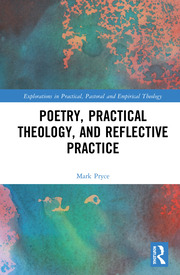
Poetry, Practical Theology and Reflective Practice
Mark Pryce
ISBN 9780367786663
Routledge
214 Pages
£29.59
PRESENTATION
This groundbreaking study offers an innovative critical analysis of poetry as a resource for reflective practice in the context of continuing professional development. In the contemporary drive in all professions for greater rigour in education, training, and development, little attention is paid to the inner shape of learning and meaning-making for individuals and groups, especially ways in which individuals are formed for the task of their work.
Building on empirical research into the author’s professional practice, the book takes the use of poetry in clergy continuing ministerial development as a case-study to examine the value of poetry in professional learning. Setting out the advantages and limitations of poetry as a stimulant for imaginative, critical reflexivity, and formation within professional reflective practice, the study develops a practical model for group reflection around poetry, distilling pedagogical approaches for working effectively with poetry in continuing professional development.
Drawing together a number of strands of thinking about poetry, Practical Theology, and reflective practice into a tightly argued study, the book is an important methodological resource. It makes available a range of primary and secondary sources, offering researchers into professional practice a model of ethnographic research in Practical Theology which embraces innovative methods for reflexivity and theological reflection, including the value of auto-ethnographic poetry.
Table of Contents:
Introduction 1 Locating the origins and context of the study 2 Researching poetics 3 Poetry in professional development – a case-study 4 Reflective practice poetry groups – pedagogy and process 5 The generative power of poetry in reflective practice 6 Conclusion and implications